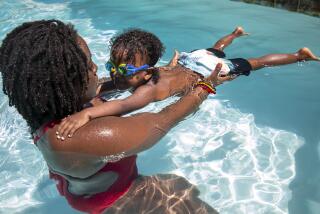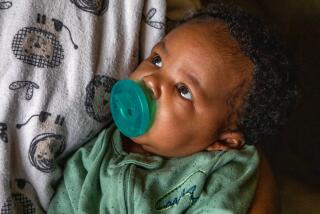Sleeping With Baby
- Share via
The debate’s been raging for years: Should parents allow babies and young children to join them in beds?
While some have argued that it is a custom rich in psychological and practical advantages for both the children and their parents, others have emphasized the dangers. A new study by the U.S. Consumer Product Safety Commission adds fuel to the debate by weighing in heavily on the side of those who say nay.
“Our recommendation is that infants should not be placed in adult beds,” said Suad Nakamura, the physiologist who conducted the study. “The safest environment for them to sleep in is a crib that meets federal and state standards.”
Nakamura came to that conclusion after spending two months searching various databases to record the number of children under age 2 who died in adult beds from 1990 through 1998. The finding: an average of 64 died per year, mostly after becoming wedged under a mattress or inadvertently suffocated by the larger body of a parent.
“I was very surprised by the result,” Nakamura said after the study was released in September. “The numbers are pretty striking.”
Strong Reactions
Others were surprised too, but in a different way. Nakamura and her organization got dozens of e-mail messages and phone calls from advocates of co-sleeping angered by her recommendations. “When you hit on something that people feel very passionate about,” she said, “you hit a different kind of nerve and see that kind of reaction. Some people sleeping with infants have done fine, and they feel that it’s not a problem. I see it from a different angle.”
Among those unmoved by the study’s numbers was the La Leche League, a support group for breast-feeding mothers that encourages families to choose whatever practices work best for them, including co-sleeping.
“There is no one right way of doing these things,” said Margie Deutsch Lash, who oversees the organization’s Orange County chapter from her home in Irvine. “But in being a mother, one often learns that the best way to do things is by co-sleeping. It can give the child what it wants, and the mother more sleep; she is able to tend to the baby immediately, which facilitates an easier time for the whole family.”
Regarding Nakamura’s statistics, she said, “You can kind of make a case for anything you want to, and there are many studies that have gone the other way. I think it’s an issue of statistics made to have a certain light. Often the cause of death in a child may have been put down as sleeping in an adult bed when they didn’t control for other issues,” such as an intoxicated parent.
Nakamura says she is aware of only two of the 515 deaths reported in her study as being alcohol related. For the rest, she said, it is unknown whether alcohol was a factor. “Most medical examiners don’t test for alcohol,” she said, referring to the data combed from coroner’s reports, death certificates and fire and police logs. “But I don’t think they are alcohol-related. Most of the deaths occur during the first month after birth. How many parents of infants go and drink during the first month?” Nakamura said.
What About Crib Deaths?
Dr. Robert Sears, a San Clemente pediatrician, believes that young children are safer sleeping with their parents than alone in their cribs. “Sleeping next to the parent snuggled up close,” he said, “the baby is in tune with the mother’s breathing and heartbeat.”
Sears cited statistics indicating 6,000 deaths a year from Sudden Infant Death Syndrome, a little understood phenomenon that mostly strikes babies in cribs. With the number of deaths in adult beds at about 64 annually, he said, it seems that “if you want to decrease your child’s risk a hundredfold, we recommend having the child sleep in your bed.”
But Ann Brown, chairman of the federal safety commission, stands by the report’s central findings.
“We had anticipated that it would be controversial,” she said, “but we thought it would simply be terrible to withhold this lifesaving information from parents. It’s up to parents to decide how to keep their infants safe, but our study provided valuable information to help them make those decisions. As a federal safety agency, that’s our job.”






